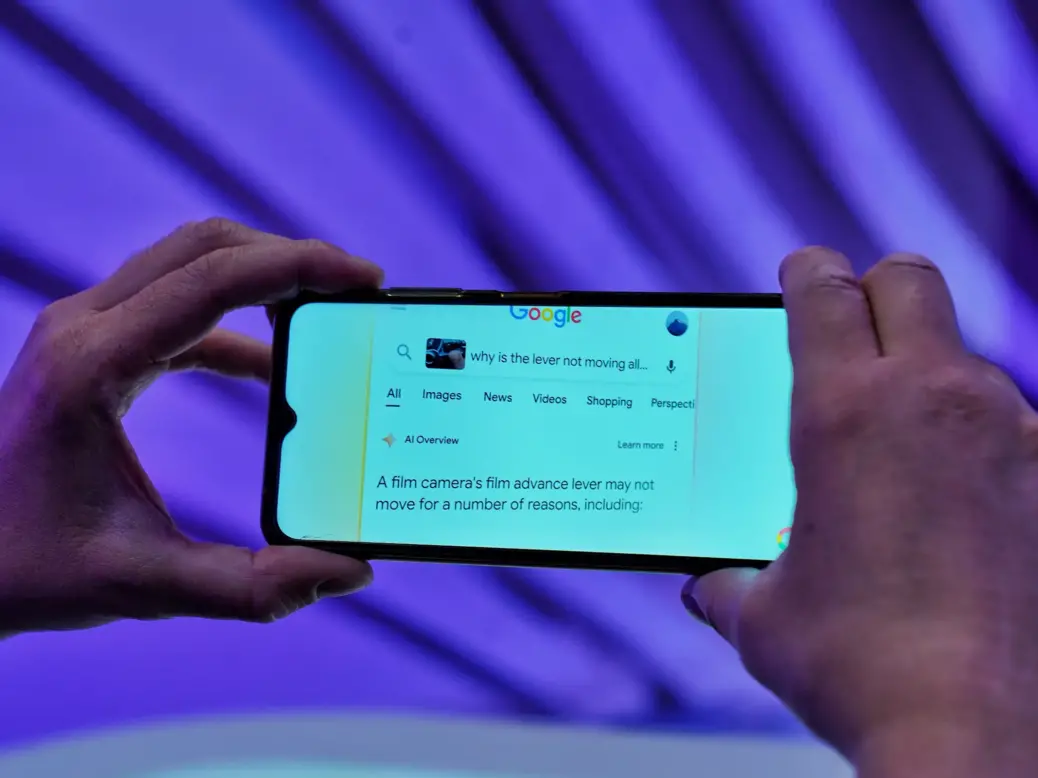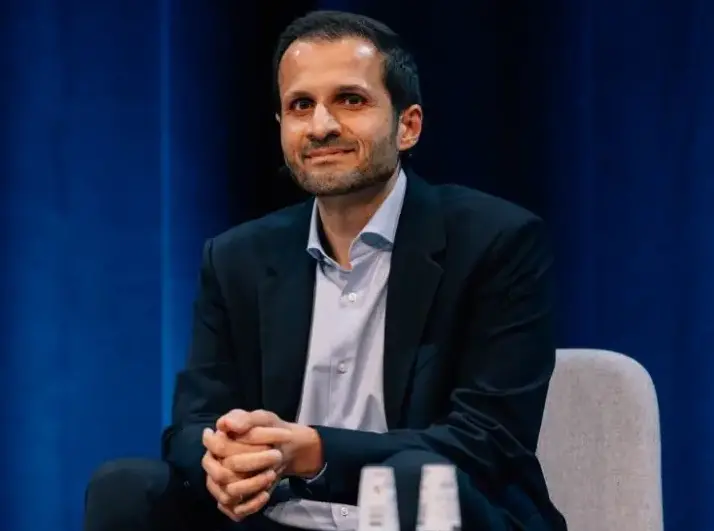
Google’s new AI-generated search results will lead to a traffic drop but it won’t be a “dramatic downward dive” for news-focused publishers, SEO expert Barry Adams has predicted.
Adams reassured publishing leaders at the WAN-IFRA World News Media Congress in Copenhagen on Wednesday that if they primarily produce news content, he believes they are “going to be okay”.
Adams was speaking a day after Google‘s vice president for global news partnerships Jaffer Zaidi told the conference it would run “counter” to the tech platform’s mission of ensuring access to information if it was in the business of “overly summarising” news content.
Google AI Overviews began rolling out in the US this month and follow last year’s Search Generative Experience trial.
For certain types of query, users are shown an AI-generated written response at the top of the search results before the usual list of links follow underneath.
Most have at least one cited source link, according to Polemic Digital founder and SEO consultant Adams, with six links on average. Most cited links are pages ranked on the first page of the search results already.
However Adams said that in his testing of several hundred queries he has never seen an AI Overviews response in a search result that generates a Top Stories box – the section at the top that is most coveted by news publishers.
His theory is that AI Overviews is “mutually exclusive” from the Query Deserves Freshness ranking function – meaning search results where Google deems the user wants up-to-date, new information, often triggering the Top Stories box.
He believes therefore that publishers that do purely news are “probably okay, for now – who knows?” but warned evergreen content will be more significantly affected.
So far there is mainly only anecdotal evidence about the impact of the introduction of AI Overviews in the US on traffic, especially as it is difficult to track. Users must be logged in to their Google account and using the Chrome browser in order to see an AI Overviews result.
But Adams said it appears that about 14% of queries on average now show AI Overviews by default. An additional 28% of queries give users the option to generate an AI summary while 58% have no AI Overviews features.
Searches using words like “how” and “why” are most likely to trigger an AI-generated result while commercial-related queries using the word “buy” are the least likely.
Google AI Overviews traffic impact: ‘Net negative but not disastrous’
How will it impact on traffic? Adams said: “The short answer is we probably don’t really know yet.”
But early anecdotal data shows that if AI Overviews are on a page and your page is not cited as a source, you lose about 2.8% of traffic.
“If you are a cited source in the AI Overview, you lose more traffic, you don’t actually gain any more traffic, because people will just read the AI Overview and say ‘oh yeah’,” Adams added. “They don’t feel the need to click through to your search result.” That traffic loss is 8.9%.
Google chief executive Sundar Pichai told The Verge the opposite last week, claiming that “people do jump off on it. And when you give context around it, they actually jump off it. It actually helps them understand, and so they engage with content underneath, too.
“In fact, if you put content and links within AI Overviews, they get higher clickthrough rates than if you put it outside of AI Overviews.”
Adams told publishers the actual traffic impact of AI Overviews appears to be “a net negative so far, but not disastrous”.
“AI Overviews will not destroy your search traffic. You will feel impact, but it’s not going to be a dramatic downward dive…
“If you produce news content primarily, you’re probably going to be okay. I don’t see that news is going to suffer too much. Because those Top Stories boxes will still be the main driver of the traffic and I do not see them in conjunction with AI Overviews.”
[Read more: Why AI-powered search from Google may NOT be disaster for publishers]
Adams added that Google does not feel it has an obligation to send traffic to publishers and is increasingly becoming a walled garden.
Google AI Overviews ‘not the death of search’ despite issues
The rollout of AI Overviews, he said, is “not the death of search – just another brick in the wall”.
He added: “There’s a lot of panic at the moment. I don’t think this is worth panicking about. I do think it’s an interesting point of conversation… I think AI Overviews are primarily designed for Google to show the world they’re in the AI race, that OpenAI is not going to overtake them… but ultimately it’s just not a very good feature.”
Adams noted there are “definitely massive inaccuracies” in the AI Overviews results so far, citing for example a response telling users they could use “non-toxic glue” to make cheese stick to pizza better. These issues have in part been put down to the fact Google signed a deal to use Reddit content to train its AI tools.
Google has said results such as these were “generally very uncommon queries, and aren’t representative of most people’s experiences”.
In addition, Adams pointed out, sometimes Google cites sources that are not actually sources, showing for example a link to healthyfitnessblogs.com which no longer exists.
Meanwhile users “hate it”, he said, pointing to a “huge spike” in Google Trends asking for help turning off AI results.
“But you’re probably not going to get rid of this anytime soon because it’s a monetisation opportunity. There will be ads coming into these AI Overviews very, very soon and Google is really all about maximising shareholder value, and increasing their revenue, so yeah, we’re going to be stuck with this for the foreseeable future.”
Adams also said, however: “It will get better, obviously. Google will iron out the kinks, will sort out the issues, but I do suspect there will always be problems with it because that’s the nature of a large language model.
“A large language model is not a knowledge base – it’s not Wikipedia. It’s a word predictor on steroids. They will hallucinate answers. They will get answers from inaccurate sources. And therefore you always need to be double checking what you’re reading in those boxes.”
Google: We’re not a publisher
Adams’s analysis came after Google’s news partnerships boss Jaffer Zaidi promised publishers: “There’s no path forward for us that doesn’t acknowledge the importance of news and the high-quality output of this industry in some way, shape or form and we’ll always put the publisher ecosystem at the forefront of our response.”
Zaidi acknowledged there are “many concerns and questions around summarisation displays” but said Google’s operating principles “institutionalise the importance of high-quality content sources and our role in connecting users to publishers”.
Zaidi said Google has “seen in any space in which we’ve operated the limits to even things like summarisation.
“I think the expectation that our users have of us at the end of the day is that we actually provide a window into the world so that they can interact through us sometimes, and then we make connections for them into the ecosystem.
“If you think about what it means to interact with Google we’re really an access point for you to get to what you’re looking for and I think we’re very mindful of the trust that we’ve built with our users… if we overextend in any way, shape or form I think that comes to some real consequences.”
He said “being a publisher ourselves, or being in the business of overly summarising, runs counter” to this mission.
Zaidi did not answer any questions directly about AI Overviews but said he views Google’s relationship with publishers as a “partnership” and that “I want us to have some shared ambition for how we actually use this technology and capability to do interesting and hopefully amazing things”.

Email pged@pressgazette.co.uk to point out mistakes, provide story tips or send in a letter for publication on our "Letters Page" blog
